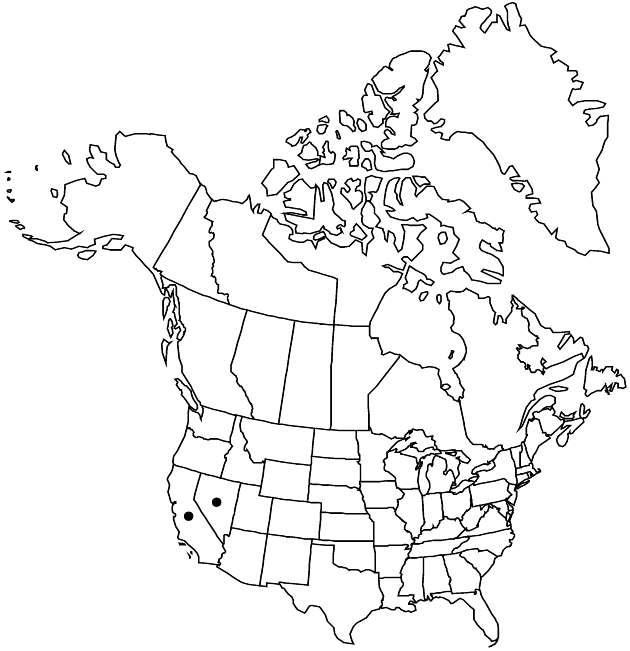Difference between revisions of "Ericameria nauseosa var. mohavensis"
Phytologia 75: 87. 1993.
Common names: Mojave rabbitbrush
Basionym: Bigelowia mohavensis Greene in A. Gray et al., Syn. Fl. N. Amer. 1(2): 138. 1884 (as Bigelovia)
Synonyms: Chrysothamnus nauseosus var. mohavensis (Greene) H. M. Hall
FNA>Volume Importer |
FNA>Volume Importer |
||
| Line 11: | Line 11: | ||
|name=Bigelowia mohavensis | |name=Bigelowia mohavensis | ||
|authority=Greene | |authority=Greene | ||
| + | |rank=species | ||
|publication_title=in A. Gray et al., Syn. Fl. N. Amer. | |publication_title=in A. Gray et al., Syn. Fl. N. Amer. | ||
|publication_place=1(2): 138. 1884 (as Bigelovia) | |publication_place=1(2): 138. 1884 (as Bigelovia) | ||
| Line 17: | Line 18: | ||
|name=Chrysothamnus nauseosus var. mohavensis | |name=Chrysothamnus nauseosus var. mohavensis | ||
|authority=(Greene) H. M. Hall | |authority=(Greene) H. M. Hall | ||
| + | |rank=variety | ||
}} | }} | ||
|hierarchy=Asteraceae;Asteraceae tribe Astereae;Ericameria;Ericameria nauseosa;Ericameria nauseosa var. mohavensis | |hierarchy=Asteraceae;Asteraceae tribe Astereae;Ericameria;Ericameria nauseosa;Ericameria nauseosa var. mohavensis | ||
| Line 41: | Line 43: | ||
-->{{#Taxon: | -->{{#Taxon: | ||
name=Ericameria nauseosa var. mohavensis | name=Ericameria nauseosa var. mohavensis | ||
| − | |||
|authority=(Greene) G. L. Nesom & G. I. Baird | |authority=(Greene) G. L. Nesom & G. I. Baird | ||
|rank=variety | |rank=variety | ||
| Line 56: | Line 57: | ||
|publication year=1993 | |publication year=1993 | ||
|special status= | |special status= | ||
| − | |source xml=https://jpend@bitbucket.org/aafc-mbb/fna-data-curation.git/src/ | + | |source xml=https://jpend@bitbucket.org/aafc-mbb/fna-data-curation.git/src/eaa6e58056e40c9ef614d8f47aea294977a1a5e9/coarse_grained_fna_xml/V19-20-21/V20_111.xml |
|tribe=Asteraceae tribe Astereae | |tribe=Asteraceae tribe Astereae | ||
|genus=Ericameria | |genus=Ericameria | ||
Revision as of 19:24, 16 December 2019
Plants 60–80 cm. Stems white to yellowish green, nearly leafless at flowering, densely tomentose. Leaves yellowish green; blades 1-nerved, filiform, 10–30 × 0.5–1.5 mm, faces glabrate. Involucres 8.5–12. Phyllaries 20–26, apices erect, acute, abaxial faces tomentose to glabrate. Corollas 7–10.9 mm, tubes puberulent, lobes 0.9–2 mm, glabrous; style appendages longer than stigmatic portions. Cypselae densely hairy; pappi 6.3–9.8 mm. 2n = 18.
Phenology: Flowering late summer–fall.
Habitat: Dry scrub Artemisia, pinyon, Atriplex, Joshua tree communities
Elevation: 400–2400 m
Discussion
Variety mohavensis may intergrade with vars. hololeuca and oreophila. It grows in southern Nevada and southern California.
Selected References
None.
Lower Taxa
None.
